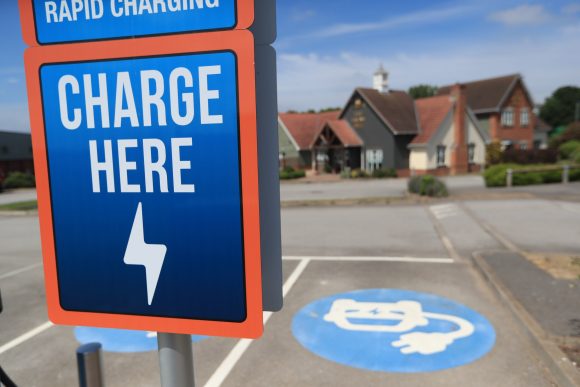The parliamentary committee has produced a new report, in which it questioned whether the government will be able to deliver its current goals when it comes to electrification. The National Grid needs to be strengthened if it is to cope with the strain of millions of electric vehicles needing to be charged, the transport committee has warned.
- Transport committee says the National Grid won’t be able to cope with additional EV charging demand
- Concerns raised that those living in rural areas will be left behind by charging network
- Report recommends more funding for local planning and transport bodies
The report raised particular concern about whether motorists living in rural areas who don’t have the ability to charge at home could be left behind by poor public charging infrastructure. The Transport Committee has set out a series of recommendations to government to increase electric vehicle (EV) uptake while ensuring the electricity demand of charging can be met.
Basing these recommendations on 148 submissions to its call for evidence, three oral evidence sessions, a survey with 979 responses and a visit to ChargePoint’s research and development lab, the committee said there are still questions on whether the government’s current plans are enough to deliver the public charging infrastructure required across all regions of the UK.
It said that there are also concerns that unless charging habits change or the national grid is strengthened, the charging needs from millions of new EVs will cause blackouts to parts of the country.
As such, the government must work with National Grid to map national coverage to identify locations where the grid won’t cope with additional usage.
Another area of the committee’s focus was interoperability, with parliamentary under secretary of state at the Department for Transport Rachel Maclean confirming to the committee that the government intends to regulate for interoperability between public chargepoints later this year. She acknowledged that while there is an overriding need to legislate, the right balance needs to be struck between making charging easier for the consumer and allowing the market to remain attractive for investment.
Interoperability has been on the government’s radar for some time, having detailed potential methods of simplifying payment in a consultation earlier this year, with these including an interoperable roaming platform established by the government, a requirement for chargepoint operators to open their networks and a market-led approach where the government doesn’t yet regulate.
This followed Matt Western, then-chair of the APPG on EVs, calling on Ecotricity, Pod Point and BP Chargemaster to implement roaming in October 2019, warning that “many MPs are expecting action on this issue, and we would be happy to support amendments to the Automated and Electric Vehicles Act to ensure it, if progress is not made”.
However, Ecotricity and Pod Point hit back, suggesting roaming agreements are “not really relevant” in light of contactless payments.
Alongside interoperability, the Transport Committee also said the government should explain how it plans to tackle the potential price differential faced by people who can’t charge their vehicles at home and therefore rely on on-street chargers, suggesting it could address the discrepancy between the 5% VAT incurred on electricity at home compared with the 20% VAT incurred at public chargepoints.
In May, HMRC confirmed that the VAT on public EV charging stands at 20%, having received requests for clarity from businesses around reduced rates due to the level of electricity being supplied.
While some EV charging networks had already been operating using the 20% VAT rate, InstaVolt announced its costs were increasing 15%, with this to be passed onto its customers.
As part of the government’s electric vehicle charging infrastructure strategy – announced in the Transport Decarbonisation Plan it must explain how it will ensure the rollout of charging infrastructure keeps pace with EV uptake, the committee said, and how it will support all regions and local authorities to deliver sufficient and well-maintained charging solutions tailored to local needs.
It must also use the strategy to set out how the £950 million Rapid Charging Fund – which is aiming to facilitate the installation of six rapid chargers on each Motorway Service area site by 2023 through financing connection costs – will be spent, with the committee stating the spending priorities are currently “obscure”.
Additionally, the strategy should set out the measures the government is taking to identify and address under-provision at locations outside the strategic road network, where grid connection costs and grid upgrades are expensive and the business case for investment is weak.
The strategy should show how the government will ensure that drivers can seamlessly access any charging network in any location at any time, while ensuring chargepoint operators are not disincentivised from investing in charging infrastructure.
Chair of the Transport Committee, Huw Merriman, said: “Putting guarantees in place on infrastructure is crucial but one report after another flags concerns to government about the provision of electric car charging infrastructure. Let ours be the last: it’s time that ministers set out the route map to delivering a network of services for everyone across the UK.”
The committee also recommended that the government uses the upcoming Planning Bill to make public chargepoint provision a requirement of local plans as well as making funding for the On-street Residential Chargepoint Scheme dependent on local authorities having detailed chargepoint plans in place which support rapid charging options.
Funding for the On-Street Residential Chargepoint Scheme was renewed in February, however research from Centrica released earlier this year found that across the next four years, only 9,317 on-street EV chargers are planned for installation by local authorities, with this being only 35 chargers per council on average.
In response to the report, Chris Pateman-Jones, CEO of Connected Kerb said there is a need to ramp up the installation of on-street charging across the board, including in urban and rural areas.
“Without reliable, affordable and accessible public charging, households without off-street parking will be left behind,” he said.

